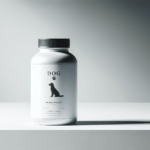
In “The Benefits of Vitamin C for Canine Health,” you’ll explore how incorporating this essential nutrient into your dog’s diet can work wonders for their overall well-being. From supporting a robust immune system to promoting healthy skin and joints, Vitamin C is a versatile addition to your pet’s health regimen. Whether you have a playful pup or a senior dog, understanding the impact of Vitamin C can help you make informed decisions about their diet and supplements. Talking to your vet about adding Vitamin C can provide the extra support your furry friend might need to live their healthiest, happiest life. Have you ever wondered if your dog could benefit from a vitamin boost? If so, you’re in the right place! Today, we’ll delve into the benefits of Vitamin C for canine health.
Introduction
When it comes to our furry friends’ health, we strive to provide them with the best. From high-quality dog food to regular veterinary visits, everything we do is aimed at ensuring their optimal health and well-being. Vitamin C is one of the key nutrients that play an important role in maintaining canine health. Let’s explore how this essential vitamin can benefit your dog.
What Is Vitamin C?
Vitamin C, also known as ascorbic acid, is a crucial nutrient for many bodily functions in both humans and animals. It is a powerful antioxidant that helps neutralize harmful free radicals in the body. In dogs, Vitamin C is synthesized in the liver, but supplementation may be necessary in certain situations to support overall health.

How Vitamin C Supports Canine Health
Antioxidant Properties
Vitamin C is known for its potent antioxidant properties. These properties help to combat oxidative stress and reduce inflammation in the body, supporting overall cellular health.
Immune System Support
Aging dogs or those experiencing stress can have compromised immune systems. Vitamin C aids in bolstering the immune system, helping your dog fight off infections and stay healthy.
Joint Health
For dogs suffering from arthritis or other joint problems, Vitamin C plays a role in collagen synthesis, which is vital for maintaining healthy cartilage. Joint supplements that include Vitamin C can support improved mobility and reduce pain.
Healthy Skin and Coat
Vitamin C also contributes to skin health by aiding in the production of collagen, essential for skin elasticity and wound healing. A shiny coat and healthy skin indicate a well-balanced diet and proper nutrient intake, including Vitamins like C.
Cardiovascular Health
Vitamin C supports the integrity of blood vessels, promoting normal blood circulation. This can be particularly beneficial for older dogs or breeds predisposed to heart conditions.
Dental Health
Did you know that maintaining oral health is crucial for a dog’s overall well-being? Vitamin C helps in gum health, reducing the chances of periodontal disease which can lead to other health issues if left untreated.
When to Consider Vitamin C Supplementation
While dogs generally synthesize Vitamin C, there are certain situations where supplementation might be beneficial:
| Situations for Supplementation | Benefits |
|---|---|
| High-stress environments | Supports immune function |
| Aging dogs | Enhances joint health and immune system |
| Post-surgery recovery | Aids in wound healing |
| Immune-compromised dogs | Strengthens overall immunity |
| Dogs with specific breed-related health issues | Provides targeted nutritional support |

Different Forms of Vitamin C for Dogs
Chewable Tablets
Chewable tablets are very convenient and often flavored to attract your dog. These can be easily incorporated as a treat.
Powders
Adding Vitamin C powder to your dog’s food is another simple way to ensure they receive their daily dose. This form is particularly useful for dogs that might be picky eaters or have difficulty with tablets.
Liquid Drops
Liquid Vitamin C can be added directly to your dog’s water bowl or food, offering a versatile option for dog owners.
How Much Vitamin C Does Your Dog Need?
The amount of Vitamin C your dog needs can vary based on several factors including age, size, and overall health. Always consult with your veterinarian to determine the appropriate dosage for your dog.
| Dog’s Weight | Recommended Daily Amount |
|---|---|
| Small dogs (under 20 lbs) | 125 mg |
| Medium dogs (20-50 lbs) | 250-500 mg |
| Large dogs (50-100 lbs) | 500-1,000 mg |
| Extra large dogs (over 100 lbs) | 1,000-2,000 mg |

Best Practices for Supplementation
Consult with Your Vet
Before introducing any new supplement into your dog’s diet, it’s crucial to discuss it with your veterinarian. They can provide personalized advice based on your dog’s specific health needs.
Start Slow
When starting a new supplement, begin with a lower dose and gradually increase it to the recommended amount. This helps your dog’s body adjust and reduces the risk of gastrointestinal issues.
Monitor Your Dog
Keep an eye on your dog’s reaction to the supplement. Look for any signs of digestive upset, such as diarrhea or vomiting, and consult your vet if these occur.
Popular Dog Health Products Containing Vitamin C
Multivitamins
Many canine multivitamins contain Vitamin C alongside other essential nutrients. These can be an excellent way to ensure your dog receives a balanced array of vitamins and minerals.
Joint Health Supplements
Joint supplements often include Vitamin C along with glucosamine and chondroitin. These are particularly useful for older dogs or those with hip and joint issues.
Skin and Coat Supplements
Supplements targeting skin and coat health usually contain Vitamin C to support collagen production and overall skin integrity.
Natural Sources of Vitamin C
While supplementation is convenient, you may also consider natural sources of Vitamin C for your dog’s diet. Here are some dog-friendly options:
| Food Source | Vitamin C Content |
|---|---|
| Bell Peppers | High |
| Kale | High |
| Broccoli | Moderate |
| Blueberries | Moderate |
| Strawberries | Moderate |
Maintaining Overall Health
In addition to Vitamin C, a well-rounded approach to your dog’s health should include:
Balanced Diet
Providing a complete and balanced diet is the foundation of good health. Look for high-quality dog food that meets their nutritional requirements.
Regular Veterinary Care
Regular check-ups with your veterinarian are vital for early detection of any health issues and for maintaining vaccinations and preventative care.
Exercise and Mental Stimulation
Regular physical activity and mental exercises are essential for keeping your dog healthy and happy. Tailor the exercise to your dog’s age and breed-specific needs.
Hydration
Always ensure your dog has access to fresh, clean water to stay hydrated.
The Role of Other Supplements
Omega-3 Fatty Acids
These are crucial for skin health, supporting joint health, and promoting a shiny coat. Often found in fish oil supplements, Omega-3 fatty acids can be highly beneficial to dogs of all ages.
Probiotics
Probiotics help maintain a healthy gut flora and support overall digestive health. These are particularly useful for dogs with sensitive stomachs or those on antibiotics.
Glucosamine and Chondroitin
These supplements are commonly used to support joint health and are particularly beneficial for older dogs or breeds prone to hip dysplasia.
Conclusion
Ensuring your dog gets adequate Vitamin C can significantly enhance their overall health and well-being. From boosting the immune system to supporting joint health, this mighty vitamin plays numerous roles.
Remember, your veterinarian is your best resource when it comes to supplementation. They can help you navigate the dosages and types of supplements that will best benefit your canine companion.
By taking these steps, you’re not just giving your dog a supplement; you’re providing them with a better quality of life. Thank you for being a responsible and caring dog owner. Here’s to many happy, healthy years with your furry friend!







